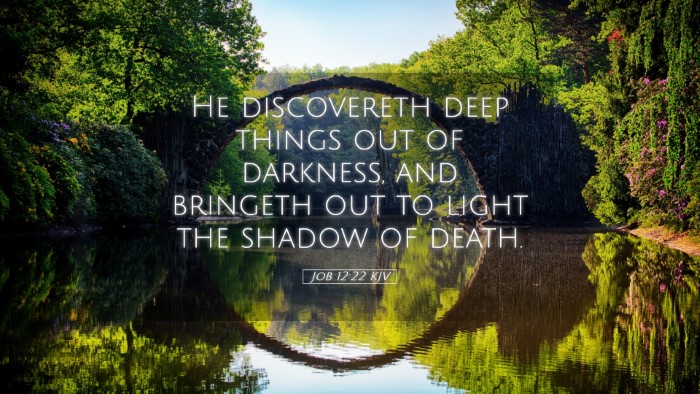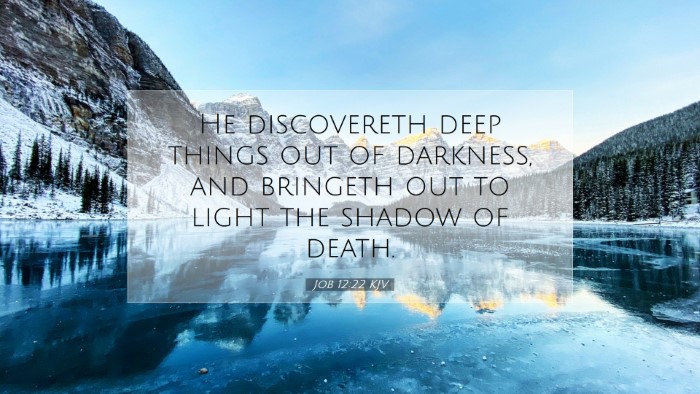Old Testament
Genesis Exodus Leviticus Numbers Deuteronomy Joshua Judges Ruth 1 Samuel 2 Samuel 1 Kings 2 Kings 1 Chronicles 2 Chronicles Ezra Nehemiah Esther Job Psalms Proverbs Ecclesiastes Song of Solomon Isaiah Jeremiah Lamentations Ezekiel Daniel Hosea Joel Amos Obadiah Jonah Micah Nahum Habakkuk Zephaniah Haggai Zechariah MalachiJob 12:22
Job 12:22 KJV
He discovereth deep things out of darkness, and bringeth out to light the shadow of death.
Job 12:22 Bible Commentary
Commentary on Job 12:22
Job 12:22 states, "He uncovers deep things out of darkness, and brings out to light the shadow of death." This verse encapsulates Job’s profound understanding of God’s sovereignty and omniscience, as well as the revelation of divine truths.
Contextual Background
The Book of Job is a poetic dialogue concerning human suffering and divine justice. Job maintains his innocence in the face of calamity, arguing for a deeper understanding of God’s ways. This verse is spoken by Job in a response to his friends, asserting his belief in God’s power to reveal truths that are hidden in darkness.
Insights from Public Domain Commentaries
Matthew Henry's Commentary
Matthew Henry emphasizes the theme of divine revelation in his analysis of Job 12:22. He notes that God is not only aware of the depths of human hearts but also unveils those mysteries to men at His discretion. Henry illustrates that God has authority over the darkness, signifying ignorance and sin, illustrating how He brings forth light and understanding. This is seen as a comfort to believers, who can trust in God’s ultimate revelation of truth.
Albert Barnes' Notes on the Bible
Albert Barnes highlights the literal and metaphorical implications of the phrase "deep things out of darkness." He explains that it refers to both physical and spiritual insight. Barnes elucidates that God’s ability to bring light signifies His omnipotence and omniscience, which should instill awe and reverence among His creation. Furthermore, Barnes asserts that this shows how God governs the world and can penetrate through the apparent chaos to unveil His plans, which are often not understood at first glance.
Adam Clarke's Commentary
Adam Clarke adds depth by exploring the cultural and theological significance of light versus darkness. In his view, darkness symbolizes ignorance and evil, whereas light represents knowledge and goodness. Clarke notes that in a world shrouded in spiritual darkness, God’s revelation is crucial for humanity’s understanding of life, death, and morality. He notes that the "shadow of death" signifies not only mortality but also the fears and uncertainties that envelop human existence. Hence, God’s illumination provides vital hope and clarity.
Theological Implications
Theologically, Job 12:22 invites serious contemplation on the nature of divine revelation. It underscores the belief that God is actively involved in human affairs, unveiling truths that transcend human comprehension. This has profound implications for pastoral care and ministry, emphasizing the necessity for believers to seek God’s wisdom in the face of suffering and uncertainty. As ministers work with congregants grappling with life's shadows, the message that God brings light to darkness is a source of solace and hope.
Practical Applications
- Encouragement in Suffering: Believers should find comfort in knowing that God sees their struggles and can reveal purpose in their pain.
- The Urgency of Seeking Truth: This verse challenges individuals to pursue a closer relationship with God, urging them to ask for wisdom and understanding in their lives.
- Hope in Spiritual Revelation: As this verse suggests, spiritual truths can illuminate situations that seem hopeless, inspiring faith and resilience.
Conclusion
Job 12:22 is a powerful reminder of God's ability to bring forth truth and clarity from the depths of darkness. Through the insights of notable commentators, we grasp its deeper meanings and applications for faith in action. Pastors, students, and theologians alike should reflect on this verse as a call to recognize God's sovereign light in a world often shadowed by despair.


